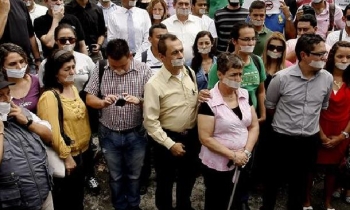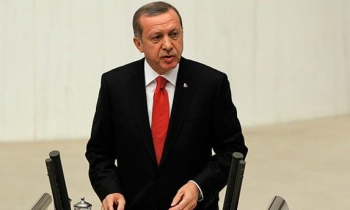MEXICO CITY – Dozens of Mexican newspapers frustrated by fruitless police probes of slain and missing journalists simultaneously published the first in a series of reports on the cases Monday.
Monday's article in Mexican and U.S.-based Spanish-language newspapers focused on the April 2005 disappearance of Alfredo Jimenez Mota, 26, who covered drug trafficking for El Imparcial, the daily newspaper in Hermosillo, Sonora, which borders Arizona.
The report named and described Sonora state families tied to drug trafficking, and pointed to evidence that Jimenez's likely abductor was Raul Enriquez Parra, an alleged smuggler whose own tortured body was found in November 2005 after being thrown from a plane.
One of Jimenez's last articles was about a possible link between Parra's drug gang and a former police chief in the Sonoran border town of Sonoyta. Monday's report suggested that police _ some of whom were Jimenez's sources _ may be linked to his disappearance.
"The most relevant fact of this story is that a year has passed since the reporter was kidnapped and the attorney general's office has nothing on his whereabouts," Monday's report said.
A spokeswoman at Mexico's Attorney General's office said she had no immediate comment.
The Inter-American Press Association released a statement Monday saying that more than 100 Mexican newspapers and numerous Spanish-language U.S. publications had published its report by a team of eight investigative reporters.
The journalists hope that, by publishing the reports simultaneously, they can protect themselves from revenge attacks by organized crime.
Media groups have said that Mexico is one of the most dangerous places in the Western Hemisphere to be a journalist, largely because of violent drug cartels. Since 2004, nine journalists have been killed in the line of duty.
At the urging of reporters and editors, President Vicente Fox named a special prosecutor in February to investigate attacks against journalists.
Reporters Without Borders, a New York-based media group, released a statement Monday urging Fox to solve Jimenez's case.
"Despite President Vicente Fox's repeated promises, the investigators have not come up with any additional clues about Jimenez's disappearance, which was clearly linked to his work as a journalist," the group said in a statement released Monday.
Reporters also have said that the lack of protection from Mexican officials is making them censor themselves.
Press association member Enrique Santos Calderon of the Bogota, Colombia, newspaper El Tiempo said Monday's joint publication was "the first step to combat organized crime and that other enemy of the press _ self censorship _ in a united manner."
Jimenez's colleagues say he called the newspaper around 9 p.m. on April 2, 2005, and sounded nervous about meeting a contact. It was the last time anyone heard from him.
After he disappeared, El Imparcial dropped bylines on drug trafficking stories and required reporters to keep editors informed of their whereabouts, said Fernando Healy, the general director of El Imparcial.
Jorge Morales, the newspaper's assistant editorial director, said the Phoenix Project also plans to finish the series that Jimenez was working on, about the region's drug gangs.









